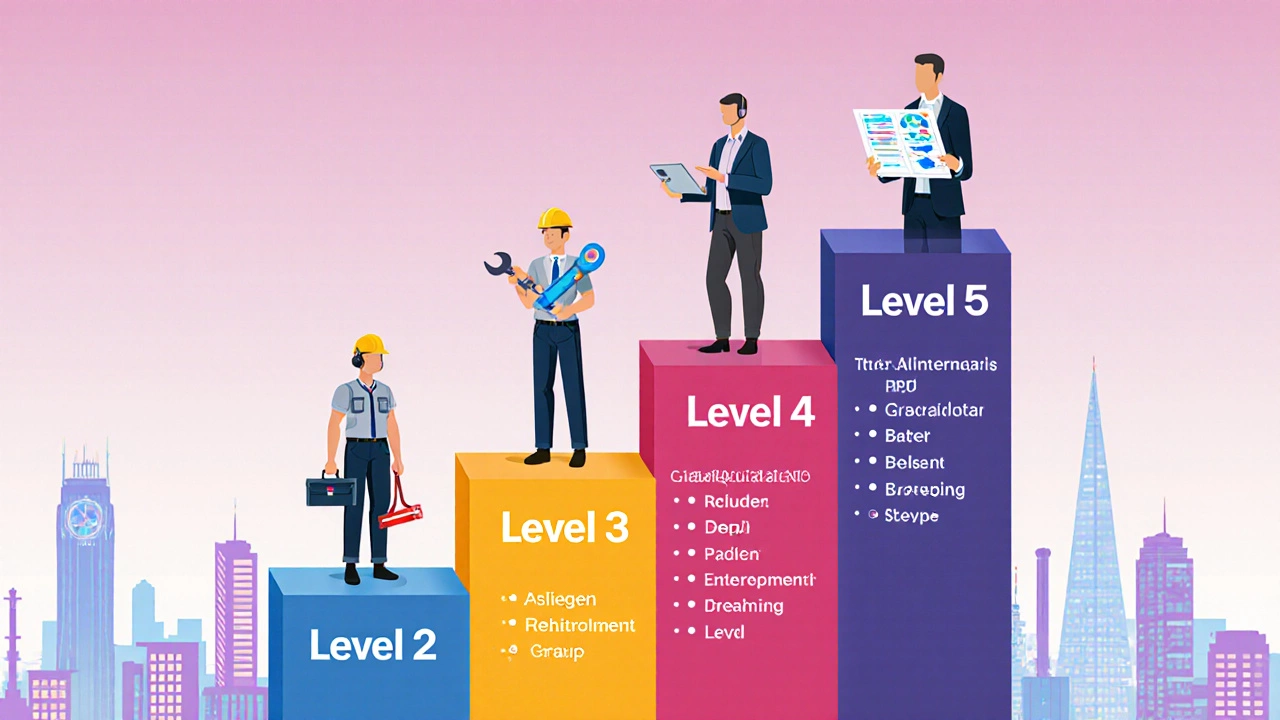NVQ Level Finder Tool
Find Your NVQ Level
Select your current role and experience level to determine the most appropriate NVQ for your career progression.
Ever wondered what the buzz around NVQ courses really means? In the UK they’re the go‑to way to prove you can do a job, not just know about it. Below you’ll get a clear picture of what an NVQ is, how the levels break down, who offers them, and why they could be your shortcut to a better career.
What is an NVQ?
NVQ (National Vocational Qualification) is a work‑based credential that measures competence in a specific role or industry. Instead of a traditional exam, you build a portfolio of real‑world evidence - think work logs, supervisor sign‑offs, and practical demonstrations - that shows you can hit the standards set by the sector.
How NVQ Levels Work
NVQs are graded from Level 1 to Level 5, each matching a higher degree of responsibility and skill.
| Level | Typical Role | Competence Focus | Entry Requirements |
|---|---|---|---|
| Level 1 NVQ | Basic helper or trainee | Following instructions safely | No prior qualifications needed |
| Level 2 NVQ | Operative or junior technician | Performing routine tasks independently | GCSEs or equivalent |
| Level 3 NVQ | Supervisor or skilled worker | Managing small teams, troubleshooting | Level 2 NVQ or relevant experience |
| Level 4 NVQ | Senior manager or specialist | Strategic planning, quality assurance | Level 3 NVQ plus several years’ experience |
| Level 5 NVQ | Executive or expert practitioner | Leadership, innovation, policy development | Level 4 NVQ and extensive professional record |
Who Offers NVQ Courses?
NVQs are delivered by a range of accredited providers, from local colleges to private training firms. The key is that they must be approved by Ofqual, the UK regulator that ensures standards stay consistent.
Well‑known awarding bodies such as City & Guilds and BTEC often issue the certificates, though the actual teaching may happen at a college, an employer’s training department, or a dedicated apprenticeship centre.

How Assessment Works
Assessment is the heart of any NVQ. It usually follows these steps:
- Identify the relevant standards for your chosen level and industry.
- Collect evidence - this can be written reports, video clips, work‑based projects, or witness testimonies.
- Submit the portfolio to an approved assessor (often an external auditor).
- The assessor reviews the evidence, may ask for a practical demonstration, and then decides if you meet the standards.
- If you fall short, you get a chance to address gaps before a final decision.
Because the evidence comes from real work, employers value the qualification as proof you can deliver on the job from day one.
Benefits of Doing an NVQ
- Career progression: Moving from a helper role to a supervisory position often requires a Level 3 or higher NVQ.
- Higher earnings: The UK Office for National Statistics reports that workers with Level 3 NVQs earn on average 10‑15% more than those without.
- Employer recognition: Many sectors - construction, health & social care, hospitality - list specific NVQ levels as entry requirements.
- Flexibility: You can study while you work, fitting assessments around your shift patterns.
- Pathway to further study: An NVQ Level 3 can count toward a diploma or HND in many colleges.

How to Enroll and What It Costs
Getting started is straightforward:
- Identify the level you need for your job or career goal.
- Find a provider - use the UK Register of Learning Providers (UKRLP) to verify legitimacy.
- Check funding options. Many learners qualify for government‑backed apprenticeships or the Adult Education Budget.
- Register, attend any required classroom sessions, and begin gathering evidence.
- Schedule your assessment with an approved assessor.
Costs vary: a Level 2 NVQ can run from £200‑£500, while Level 4 or 5 may exceed £1,200. However, apprenticeships often cover tuition, and some employers reimburse the fee as part of professional development.
Key Takeaways
- NVQs certify you can do a job, not just know about it.
- There are five levels, each matching higher responsibility.
- Accredited providers and regulators like Ofqual ensure quality.
- Assessment is portfolio‑based, reflecting real‑world performance.
- Holding an NVQ can boost salary, open promotion routes, and support further study.
Frequently Asked Questions
Can I start an NVQ without any prior qualifications?
Yes. Level 1 NVQs have no formal entry requirements, making them ideal for school leavers or career‑changers.
How long does it take to complete a typical NVQ?
Timing depends on the level and your work schedule. Most Level 2‑3 courses finish in 6‑12 months, while Level 4‑5 can span 12‑24 months.
Are NVQs recognized outside the UK?
Internationally, NVQs are often viewed as evidence of vocational competence, especially in Commonwealth countries. However, you may need to map them to local qualification frameworks.
Do NVQs lead directly to a university degree?
While an NVQ itself isn’t a degree, many colleges accept Level 3 or 4 NVQs as credit toward HNDs or bachelor's programs in related fields.
What’s the difference between an NVQ and a BTEC?
Both are vocational, but NVQs focus on competence in a job role, whereas BTECs assess knowledge and understanding through coursework and exams.





Write a comment